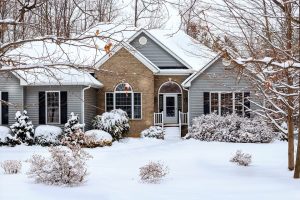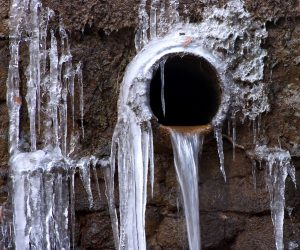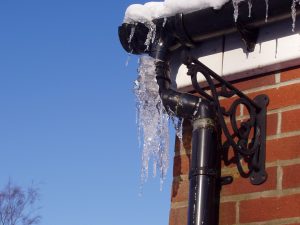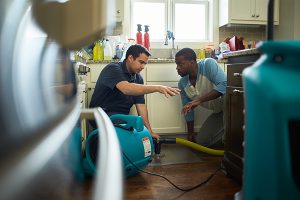For those living in the Midwest, we know that winter storms can be brutal, causing cancellations, water damage, and even dangerous hazards that threaten personal safety. But wind and sleet can be especially destructive during severe blizzards. Although we are more than halfway through winter, our homes are still prone to damage from harsh winter weather conditions.
Here are some winter safety tips for homeowners to ensure that your building materials make it through the last cold months before welcoming spring.
1.  Keep Driveways Salted
Keep Driveways Salted
Even during weather that fluctuates around freezing temperatures can be dangerous for both you and your family. Black ice is one of the biggest hazards when it comes to personal injury during the winter. But this can be easily prevented by salting the driveway and other exterior walking areas, such as porches, patios, outdoor steps, etc.
But be careful if you have pets as normal de-icing salt will burn and damage paws as well as poison them if eaten. But simple solutions include buying pet booties, using pet-friendly salt, or applying a wax barrier to their paws will protect against the harsh salt.
2. Heating Cables for Ice and Snow Buildup
If your home is prone to holding significant amount of snow that doesn’t slide off itself, consider investing in heating cables. They can be installed on the roof that would melt ice and snow to prevent leaks and/or cracks in the room.
3. Preventing Frozen Pipes
 For all homeowners, who have experienced burst pipes before, this can be their worst nightmare. If water is left to freeze in the pipe, it expands and applies pressure to the interior parts of the pipe. Eventually, the pipe will develop a fissure and burst, spraying water everywhere and ruining all structural materials in its path.
For all homeowners, who have experienced burst pipes before, this can be their worst nightmare. If water is left to freeze in the pipe, it expands and applies pressure to the interior parts of the pipe. Eventually, the pipe will develop a fissure and burst, spraying water everywhere and ruining all structural materials in its path.
Be aware of which pipes that are at most risk of freezing including those that are exposed to the outdoors, like sprinkler lines and hose bibs. Pipes located in unheated areas of the home are also at risk, including behind walls, under floors, in the basement, crawlspace, attic, etc.
But even during extremely cold temperatures, you can prevent them from freezing by taking the following steps:
- Set up a space heater in unheated areas of the home, such as in the attic, basement, and crawlspace.
- Set up an infrared lamp next to pipes behind walls and floors. The heat generated from the lamp will pass through the structural materials and prevent the hidden pipe from freezing.
- Wrap uninsulated pipes with electrical tape or insulation.
- Open kitchen and bathroom cabinets to allow warm air to circulate around the pipes below.
4. Keep the Chimney Clean
Nothing beats sitting next to a warm fire during the extreme winter temperatures. But having a clean chimney is essential towards preventing fire disasters during the colder seasons.
It is recommended by The Chimney Safety Institute of America to have your chimney cleaned and inspected at least once each year. You should also make sure that the flue is always opened to circulate the smoke out of the home and is closed after the fire to prevent cold air from seeping in.
5. Establish and Practice a Fire Safety Plan
 All families should have an emergency fire safety plan. Make sure that everyone is aware of the best evacuation route and that they know the location of all fire extinguishers. If you have young kids, frequent rehearsing fire drills will keep the plan fresh in their minds so they know exactly what to do when the unexpected happens. Contact our Omaha fire & smoke damage restoration experts to learn more.
All families should have an emergency fire safety plan. Make sure that everyone is aware of the best evacuation route and that they know the location of all fire extinguishers. If you have young kids, frequent rehearsing fire drills will keep the plan fresh in their minds so they know exactly what to do when the unexpected happens. Contact our Omaha fire & smoke damage restoration experts to learn more.
6. Avoid Water Damage from Melting Snow
After the weather starts to warm up again, the home – especially the roof – is prone to significant water damage and even mold growth. Keep in mind that just a foot of snow on the roof will result in a few inches of water. If there were any unrepaired leaks before or during the snowfall, it is likely that they have grown worse now. This can also cause considerable damage within the attic, insulation, and upper floors of the home.
But to prevent these problems from destroying structural materials, have the snow removed from your roof immediately after each snow storm. If there are any leaks that can’t be prepared right away, tarp over the hole and set up drip buckets to protect your floors against water damage. If you have severe water damage already, don’t hesitate to call our professional water damage restoration experts in Omaha, NE.
7. Prevent Gutter Collapse from Ice
 Prevent your gutters from collapsing from accumulated ice on the inside. Especially during heavy winter storms, ice, snow, sleet, and other debris can become caught, cause blockages, and pull the gutters off of the house.
Prevent your gutters from collapsing from accumulated ice on the inside. Especially during heavy winter storms, ice, snow, sleet, and other debris can become caught, cause blockages, and pull the gutters off of the house.
Before each winter storm, make sure that water can easily drain out of the gutters and knock out the ice afterwards. If you can’t get the ice out, you may have to contact a professional to melt it.
8. Prevent Roof Collapse from Heavy Snow
Even in its frozen form, water weighs a ton! Many property owners simply believe that it will melt and drain through the gutters, but not always. In fact, according to the Insurance Institute for Business and Home Safety, a roof can collapse under as little as two feet of snow. But even if it doesn’t, the roof is prone to severe water damage, especially when it starts to warm up.
To prevent this disaster from happening to your home, ensure your roof is in good condition before the winter hits. Contact a professional roofing company to conduct an inspection and consider their suggestion of maintenance or repairs. During the winter, make sure that all the snow is removed from the roof by a professional as the job can be dangerous without the proper equipment.
What to Do When Finding Severe Water Damage
 Taking steps to protect personal safety and prevent damage will surely lessen your chances of accidents happening. But it’s impossible to guarantee that anything won’t happen. At any time your home incurs any structural damage from rain, water, ice, snow, sleet, etc., don’t hesitate to contact ServiceMaster Restoration Services.
Taking steps to protect personal safety and prevent damage will surely lessen your chances of accidents happening. But it’s impossible to guarantee that anything won’t happen. At any time your home incurs any structural damage from rain, water, ice, snow, sleet, etc., don’t hesitate to contact ServiceMaster Restoration Services.
Available 24/7 in the Omaha, NE area, our professionals are both licensed and experienced to provide emergency water damage restoration services for homes of all sizes. Using commercial equipment and advanced techniques, we can have all excess water removed and the structure dried out efficiently and effectively. Give us a call at (402) 986-6863 and we will arrive within 2 hours to get started with the mitigation.
Winter Safety Tips for Homeowners was last modified: February 13th, 2018 by ServiceMaster Restoration Services - Omaha.

